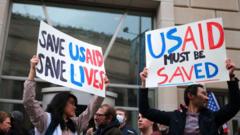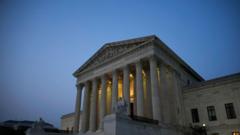In a critical intervention, a federal court has issued a temporary restraining order against President Donald Trump’s plan to suspend operations for thousands of USAID employees, following a formal lawsuit from labor unions representing the agency's workforce.
**Federal Court Halts Trump's Plan to Suspend USAID Staff**

**Federal Court Halts Trump's Plan to Suspend USAID Staff**
A temporary restraining order has been issued by a federal judge, blocking President Trump's controversial plan to halt operations at the USAID agency.
President Trump has faced legal pushback against his efforts to diminish the role and workforce of the United States Agency for International Development (USAID), which is crucial for international developmental aid.
The federal court's decision arose from concerns that Trump's plan to place 2,200 employees on administrative leave, effectively gutting two-thirds of USAID's workforce, was unconstitutional and did not stem from congressional authority. The agency employs around 10,000 people, majorly operating outside the U.S.
The judge, Carl Nichols, who was appointed by Trump, stated that a formal written order would be forthcoming, underscoring the importance of legal procedures in governance. The lawsuit highlighted that only Congress has the authority to dismantle federal agencies, indicating potential overreach by the Trump administration.
Trump has criticized USAID, arguing that its operations are a misuse of taxpayer dollars, wanting to align foreign assistance with his "America First" policy. This plan, however, has drawn significant scrutiny, particularly from former agency heads like Gayle Smith, who argue that reducing humanitarian aid efforts sends a damaging message about U.S. commitments to global aid and crisis response.
The agency is a significant player in global humanitarian efforts, with the U.S. being the largest single donor to international aid, accounting for a substantial portion of the $68 billion spent globally on humanitarian assistance in 2023. The ramifications of Trump's plan could not only affect assistance programs but could also alter perceptions of U.S. reliability and commitment to global humanitarian standards.
As the legal battle unfolds, it remains to be seen how these developments will reshape the future of USAID and U.S. foreign aid dynamics.
The federal court's decision arose from concerns that Trump's plan to place 2,200 employees on administrative leave, effectively gutting two-thirds of USAID's workforce, was unconstitutional and did not stem from congressional authority. The agency employs around 10,000 people, majorly operating outside the U.S.
The judge, Carl Nichols, who was appointed by Trump, stated that a formal written order would be forthcoming, underscoring the importance of legal procedures in governance. The lawsuit highlighted that only Congress has the authority to dismantle federal agencies, indicating potential overreach by the Trump administration.
Trump has criticized USAID, arguing that its operations are a misuse of taxpayer dollars, wanting to align foreign assistance with his "America First" policy. This plan, however, has drawn significant scrutiny, particularly from former agency heads like Gayle Smith, who argue that reducing humanitarian aid efforts sends a damaging message about U.S. commitments to global aid and crisis response.
The agency is a significant player in global humanitarian efforts, with the U.S. being the largest single donor to international aid, accounting for a substantial portion of the $68 billion spent globally on humanitarian assistance in 2023. The ramifications of Trump's plan could not only affect assistance programs but could also alter perceptions of U.S. reliability and commitment to global humanitarian standards.
As the legal battle unfolds, it remains to be seen how these developments will reshape the future of USAID and U.S. foreign aid dynamics.



















